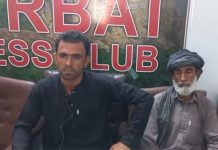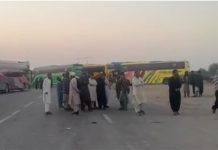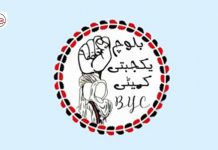Pakistani authorities have imposed an indefinite ban on official website of Human Rights Commission of Balochistan (also known as Hakkpaan)
HRCB claims to b a non-profit human rights organization operating in Balochistan; a region that already suffers from strict levels of media restriction. They also have firm bases in foreign countries like Sweden, the UK and France. From the past few years, HRCB has been actively working in Balochistan to collect information about the ongoing human rights abuses and report them to the international media and organizations. They employ “a network of volunteers and supporters” that assemble and communicate information from the remotest corners of Balochistan.
According to The Balochistan Post news desk; authorities have banned HRCB’s official website in Pakistan. If attempted to access, the website states that: “Surf Safely! The site you are trying to access contains content that is prohibited for viewership from within Pakistan.”
In an official statement, HRCB exhibited shock on this act and mentioned that they are a fair and unbiased “human rights organisation” and not “a party to the war in Balochistan.” In an apprehensive tone, HRCB expressed their fear that after the unanticipated banning of their website, Pakistani authorities might target their “volunteers and office-bearers who are living in the country.”
Media restriction is not a new phenomenon in Balochistan. Despite transparent and fair reporting, our journalism media – The Balochistan Post network – is also banned in Pakistan. Our readers are obliged to use technical stratagem to bypass restrictions and access our websites – like using VPNs or online proxies. Some other media and human rights organizations are also banned in Pakistan.
Journalist bodies and rights group allege that “Balochistan functions under abysmal media restrictions: public opinion is suppressed, political dissent is confronted with brute force and freedom of speech is curtailed.”
According to many campaign groups, “human rights activists, political dissidents and journalists are constantly harassed through the misuse of Prevention of Electronic Crimes Act in Balochistan. Any kind of information relevant to the Law Enforcement Agencies is considered “harmful” and, therefore, its propagations is forbidden. Furthermore, any information about CPEC is also withheld and its dissemination is deemed an issue of “national security”. Cellular networks and the internet are frequently cut off for “security reasons”.”
It is believed that under all these restrictions, credible information is very difficult to come by. Extreme media censorships are the reason why Balochistan has earned the sobriquet of “Pakistan’s information Blackhole” in the international media.
Talking to TBP, a renowned activist from Balochistan on condition of anonymity said, “human rights abuses are mainstream in Balochistan. Under the pretexts of “counter-insurgency” or “re-establishment of peace”, security forces have executed uncountable misdeeds. Enforced disappearances are a major human rights issue in Balochistan. Despite the promising negotiations with the authorities, such disappearances continue unabated. Baloch activists have also believed to be abducted from foreign countries, like Sweden or UAE. Such disappearances compelled Mama Qadeer Baloch – a renowned human rights activist from Balochistan – to break a world record by marching from Quetta to Islamabad. Mama Qadeer and his organization, Voice for Baloch Missing Persons (VBMP), are protesting in front of the Quetta press club for the past ten years.”
According to campaign groups, kill-and-dumps are another major human rights abuse in Balochistan. Following forceful abduction, detainees are tortured, killed and thrown at anonymous locations. Sidique Eido, an active member of Human Rights Commission of Pakistan, and his comrade Yusuf Nazir, a member of Baloch Student Organization, were abducted from Gwadar after a court hearing in December 2010. According to the eyewitnesses, the perpetrators were the personnel of “state security forces”. In a statement, HRCP had stated that the policemen escorting the detainees “had seen Mr Eido being taken away by individuals in FC uniform.” The dead bodies of the abductees were found months later in Ormara Balochistan and bore obvious marks of torture. Their families were also threatened to abandon the case or else await a similar fate. Asma Jahangir, the former chairperson of HRCP and a world-renowned activist, was compelled to travel to Balochistan and question the authorities on the incident.
A similar fate befell Mohammad Nawaz Atta, a human rights activist and the secretary of Baloch Human Rights Organization (BHRO). Mr Atta was allegedly kidnapped from his residence in Karachi and taken away by the Sindh Rangers.
Furthermore, activists and campaigners demanding the instant release of abductees and the immediate cessation of enforced disappearances are victimized themselves. Rashid Hussain – a human rights activist – went missing in UAE in December 2018 and his whereabouts are not known to this day. Sajid Hussain – an exiled Pakistani Journalist and the antemortem editor of The Balochistan times – went missing in March this year. His dead body was found on April 23 in a river in Sweden. International media acknowledges that Sajid Hussain’s death is directly related to his work as a journalist and a human rights activist.
Due to extreme negligence, Balochistan is plagued with innumerable human rights issues. Lack of education and healthcare infrastructure; continuous sectarian violence; relentless army operations; forceful relocation of hundreds of families; suppression of dissent; incessant corruption and the lack of necessities of life are a few notable human rights problems in Balochistan.






























